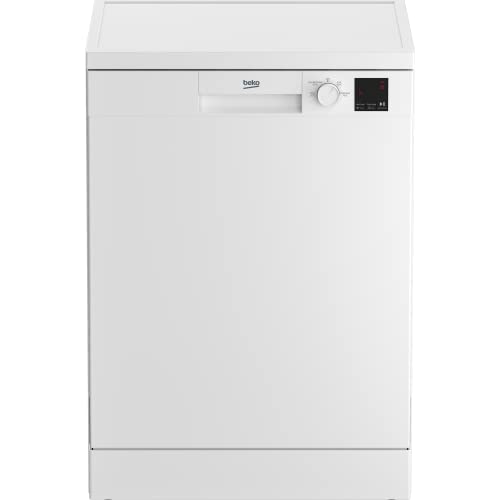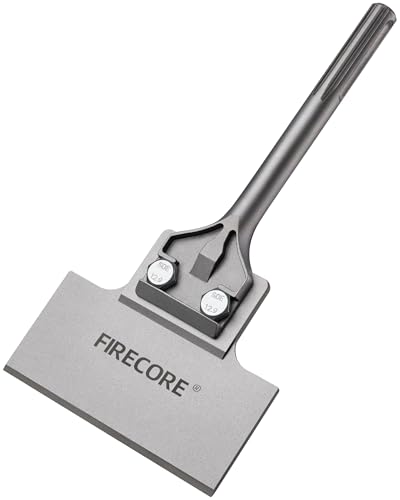




If you’re tired of your dishwasher leaving behind food residue and unpleasant odors, it might be time to give it a good cleaning. Regular maintenance and cleaning of your dishwasher can help extend its lifespan and improve its performance. Thankfully, there are several simple and effective cleaning hacks that you can try to keep your dishwasher running smoothly and producing sparkling clean dishes every time.
One of the best ways to clean your dishwasher is by using vinegar. Fill a cup with white vinegar and place it on the top rack of your empty dishwasher. Then, run a hot water cycle. The vinegar helps remove grease and grime buildup and eliminates any lingering odors. For an added boost, sprinkle some baking soda on the bottom of the dishwasher before running the cycle.
If your dishwasher has a filter, it’s important to clean it regularly to keep your dishwasher functioning optimally. Remove the filter and rinse it under hot water to remove any trapped debris. For a deeper clean, soak the filter in warm soapy water and scrub it with a brush. This will help prevent clogs and ensure that your dishes come out cleaner.
Another effective cleaning hack for your dishwasher is to use citric acid. Citric acid naturally breaks down mineral deposits and stubborn stains. You can buy citric acid powder and sprinkle it in the bottom of your dishwasher before running a cycle. This will help remove any limescale buildup and leave your dishwasher looking and smelling fresh.
Pro tip: To keep your dishwasher smelling fresh in between cleanings, leave the door slightly ajar after running a load. This allows air to circulate and prevents mold and mildew from growing.
Don’t forget to clean the exterior of your dishwasher as well. Use a mixture of warm water and dish soap to wipe down the door, control panel, and handle. For stubborn stains, make a paste using baking soda and water and gently scrub the affected areas. This will help remove any grease or fingerprints and leave your dishwasher looking shiny and new.
Lastly, it’s important to regularly check the spray arms of your dishwasher. These are the small spinning devices that distribute water and detergent throughout the dishwasher. Over time, debris can clog the spray arms and affect their performance. Remove the spray arms and rinse them under hot water to remove any clogs. This will help ensure that your dishes are thoroughly cleaned and prevent any damage to your dishwasher.
By incorporating these simple cleaning hacks into your routine, you can keep your dishwasher in top condition and enjoy spotless dishes every time. Remember to schedule regular deep cleanings and maintenance to keep your dishwasher running efficiently for years to come.
Effective Cleaning Tips for Your Dishwasher
1. Clean the Filters Regularly
The filters in your dishwasher are designed to catch food particles and debris, preventing them from clogging the drain or spraying onto your clean dishes. It is important to clean these filters regularly to ensure proper dishwasher performance.
To clean the filters, remove them from the dishwasher and rinse them under running water to remove any accumulated residue. Use a small brush or toothbrush to gently scrub away any stubborn dirt or debris. Once cleaned, reassemble the filters and put them back in their place.
2. Use Vinegar for a Deep Clean
Vinegar is a versatile cleaning agent that can effectively remove built-up mineral deposits and soap scum from the interior of your dishwasher. To give your dishwasher a deep clean, place a cup of white vinegar in a dishwasher-safe bowl or on the top rack of the dishwasher.
Run a hot water cycle with the vinegar to help break down and remove any residue. This will also help eliminate any odors that may have developed in your dishwasher. After the cycle is complete, wipe down the interior of the dishwasher with a soft cloth or sponge.
3. Scrub the Spray Arms
Over time, the spray arms in your dishwasher can become clogged with food particles and mineral deposits, leading to poor water circulation and reduced cleaning efficiency. To clean the spray arms, remove them from the dishwasher and rinse them under running water.
Use a brush or toothpick to remove any debris that may be blocking the spray holes. Pay attention to the center hub and ensure that it is also free from any blockages. Once cleaned, reattach the spray arms to the dishwasher.
4. Check the Door Seal
The door seal, also known as the gasket, is responsible for creating a watertight seal when the dishwasher is in use. Over time, the door seal can become dirty or damaged, leading to leaks and poor performance.
Regularly inspect the door seal for any signs of dirt, mold, or damage. If necessary, clean the seal with a mild detergent and warm water solution. Ensure that the seal is free from any debris or buildup, and replace it if it is damaged or worn out.
5. Run an Empty Cycle with Dishwasher Cleaner
In addition to regular cleaning, it is recommended to run an empty cycle with dishwasher cleaner every few months to remove any stubborn stains and odors.
Follow the instructions on the dishwasher cleaner package for the recommended amount to use. Place the cleaner in the detergent dispenser or on the bottom rack of the dishwasher, and run a hot water cycle. This will help keep your dishwasher clean and fresh.
6. Wipe Down the Exterior
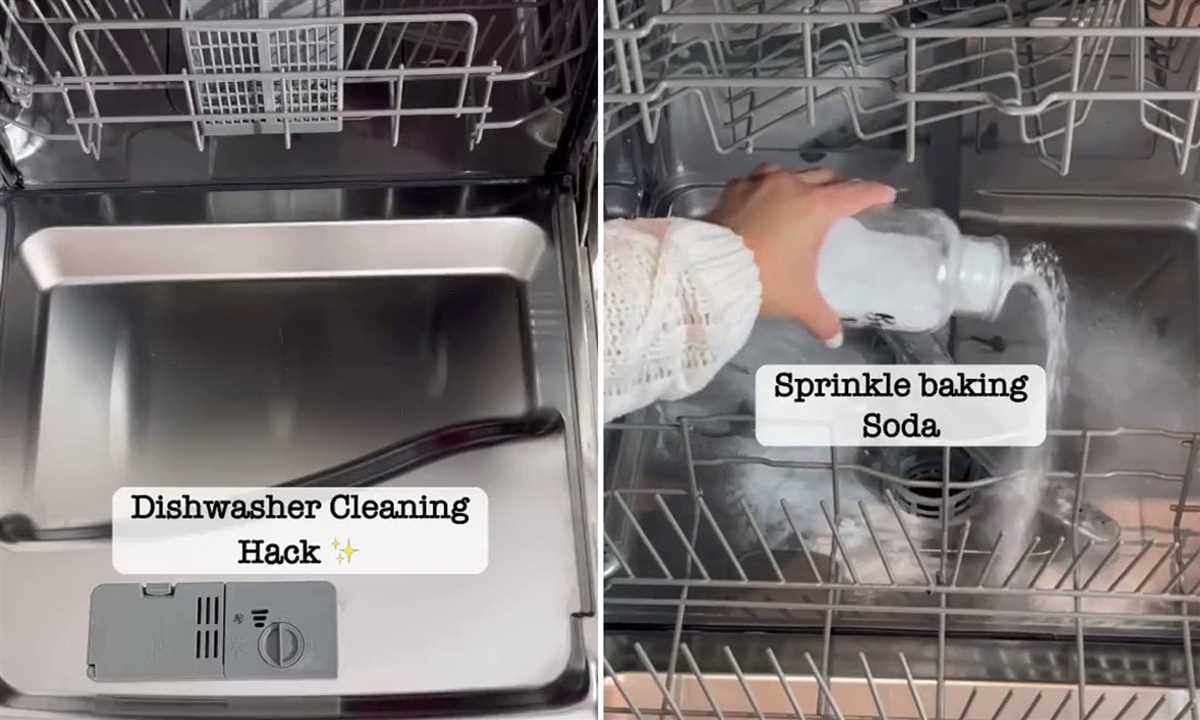
Don’t forget to give the exterior of your dishwasher some attention as well. Wipe down the exterior surfaces with a damp cloth and mild detergent to remove any fingerprints, smudges, or dirt.
Pay attention to the control panel, buttons, and handles, as these areas tend to accumulate grime over time. Dry the exterior with a clean cloth to prevent water spots.
7. Use the Dishwasher Properly
Properly loading and using your dishwasher can help keep it clean and maintain its performance. Be sure to scrape off excess food from plates and utensils before placing them in the dishwasher to prevent clogging and buildup.
Load the dishwasher according to the manufacturer’s instructions, ensuring that water can freely flow between dishes. Avoid overcrowding the dishwasher, as this can hinder proper cleaning and drying.
| Cleaning Tips for Your Dishwasher |
|---|
| 1. Clean the filters regularly. |
| 2. Use vinegar for a deep clean. |
| 3. Scrub the spray arms. |
| 4. Check the door seal. |
| 5. Run an empty cycle with dishwasher cleaner. |
| 6. Wipe down the exterior. |
| 7. Use the dishwasher properly. |
Essential Dishwasher Cleaning Hacks
1. Vinegar Rinse
An easy and effective hack for cleaning your dishwasher is to run a vinegar rinse. Simply place a cup of vinegar on the top rack and run a hot water cycle. The vinegar will help remove any built-up grease and grime from the interior of the dishwasher.
2. Baking Soda Scrub
If your dishwasher has stubborn stains or residue, create a baking soda scrub. Mix equal parts baking soda and water to form a paste. Use a sponge or cloth to scrub the paste onto the affected areas. Rinse with water to remove any residue.
3. Filter Cleaning
To ensure your dishwasher works efficiently, it’s important to clean the filter regularly. Remove the filter and rinse it under warm water to remove any debris or food particles. Use a toothbrush or soft brush to scrub away any stubborn debris.
4. Door Gasket Care
The door gasket of your dishwasher can collect dirt and grime over time. To clean it, mix a solution of water and mild soap. Use a cloth or sponge to gently clean the gasket. Be sure to dry it thoroughly to prevent mold or mildew growth.
5. Silverware Basket Soak
Your dishwasher’s silverware basket can become dirty and smelly. To freshen it up, remove the basket and soak it in a mixture of warm water and dish soap. After soaking, rinse it thoroughly and let it dry completely before reinserting it into the dishwasher.
6. Clean the Spray Arms
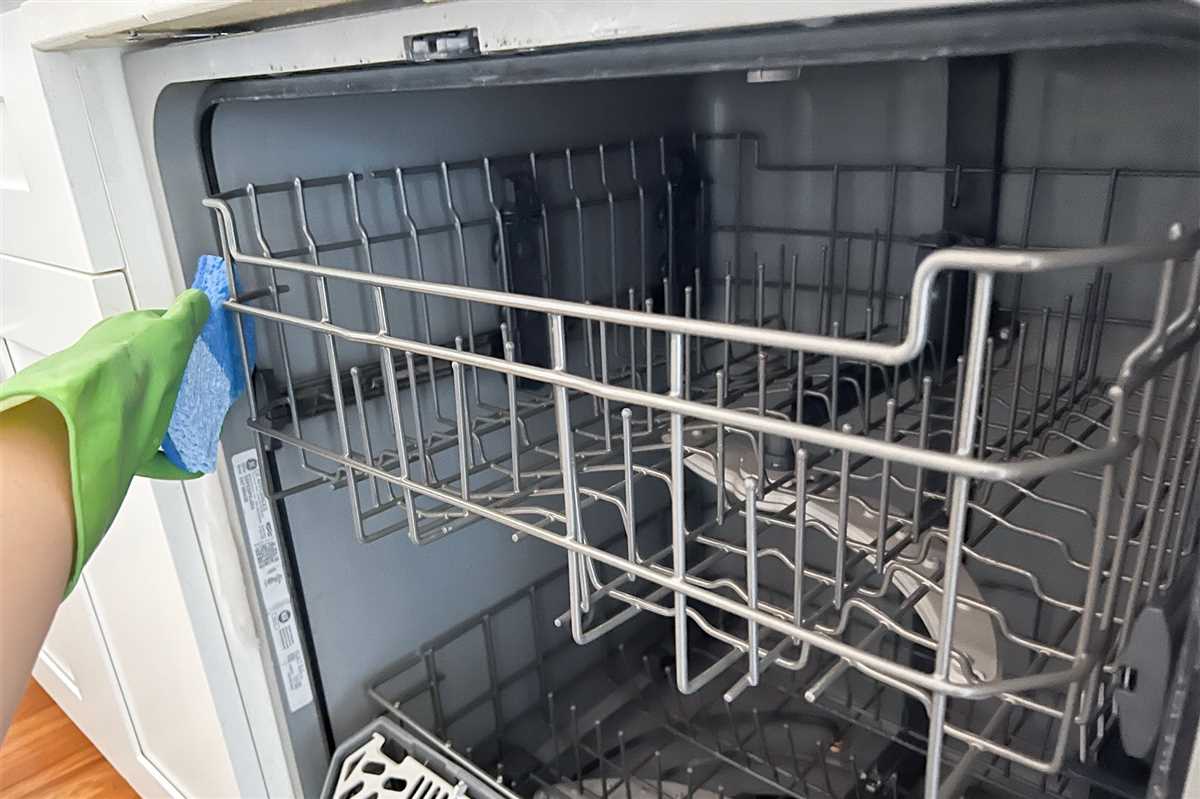
The spray arms of your dishwasher can become clogged with mineral deposits or debris. Remove the spray arms and rinse them under running water to remove any blockages. Use a toothpick or small brush to clean out any stubborn buildup.
7. Run an Empty Cycle
Occasionally running an empty cycle with hot water and a dishwasher cleaner can help remove any lingering odors or buildup. Follow the instructions on the dishwasher cleaner for the best results.
- Vinegar Rinse
- Baking Soda Scrub
- Filter Cleaning
- Door Gasket Care
- Silverware Basket Soak
- Clean the Spray Arms
- Run an Empty Cycle
| Hack | Description |
|---|---|
| Vinegar Rinse | Run a hot water cycle with vinegar to remove grease and grime. |
| Baking Soda Scrub | Create a paste with baking soda and water to scrub away stains and residue. |
| Filter Cleaning | Rinse the filter under warm water and scrub away debris. |
| Door Gasket Care | Clean the door gasket with a solution of water and mild soap. |
| Silverware Basket Soak | Soak the silverware basket in warm water and dish soap to freshen it up. |
| Clean the Spray Arms | Rinse the spray arms to remove blockages and buildup. |
| Run an Empty Cycle | Occasionally run an empty cycle with dishwasher cleaner to eliminate odors and buildup. |
Natural Cleaners for a Sparkling Dishwasher
Keeping your dishwasher clean not only helps it run more efficiently, but it also ensures that your dishes come out sparkling clean. Rather than using harsh chemicals, you can try these natural cleaners to maintain your dishwasher and keep it looking and smelling fresh.
Vinegar
Vinegar is a versatile natural cleaner that can be used in many household cleaning tasks, including cleaning your dishwasher. To use vinegar as a dishwasher cleaner, place a cup of white vinegar in a dishwasher-safe container, such as a measuring cup, and place it on the top rack of your dishwasher. Run a hot water cycle without any dishes or detergent. The vinegar will help remove grease, grime, and odors from your dishwasher, leaving it clean and fresh.
Baking Soda
Baking soda is another effective natural cleaner that can be used in your dishwasher. Sprinkle half a cup of baking soda along the bottom of your dishwasher and run a hot water cycle. The baking soda will help remove stains and odors, leaving your dishwasher smelling fresh.
Citric Acid
Citric acid is a natural cleaner that can be used to remove mineral deposits and hard water stains from your dishwasher. You can find citric acid in the form of powdered citric acid or in concentrated lemon juice. To use citric acid, sprinkle a tablespoon of powdered citric acid or pour half a cup of concentrated lemon juice into the bottom of your empty dishwasher. Run a hot water cycle without any dishes or detergent. The citric acid will help dissolve mineral deposits and remove stains, leaving your dishwasher clean and shiny.
Salt
Salt is another natural cleaner that can be used to clean your dishwasher. Sprinkle a cup of salt along the bottom of your empty dishwasher and run a hot water cycle. The salt will help remove food particles and grease, leaving your dishwasher clean and fresh.
Essential Oils
Adding a few drops of essential oils to your dishwasher can help give it a fresh, pleasant scent. After cleaning your dishwasher with one of the natural cleaners mentioned above, add a few drops of your favorite essential oil, such as lemon, lavender, or peppermint, to a dishwasher-safe container placed on the top rack of your dishwasher. Run a hot water cycle without any dishes or detergent. The essential oils will leave your dishwasher smelling delightful.
Regular Maintenance
In addition to using natural cleaners, it’s important to regularly maintain your dishwasher to keep it running efficiently. This includes regularly removing any food debris from the filter, wiping down the door and gaskets with a damp cloth, and checking the spray arms for clogs or blockages. By following these regular maintenance tips, you can ensure that your dishwasher stays in top condition.
By using these natural cleaners and following regular maintenance tips, you can keep your dishwasher sparkling clean and running efficiently, while also reducing the use of harsh chemicals in your home.
Maintaining Your Dishwasher for Longevity
Maintaining your dishwasher properly is essential for its longevity and optimal performance. By following these simple steps, you can ensure that your dishwasher stays clean, odor-free, and in excellent working condition for years to come.
1. Clean the Filter Regularly
One of the most important tasks when it comes to dishwasher maintenance is cleaning the filter. The filter traps food particles and debris, preventing them from clogging the dishwasher’s spray arms and pump. To clean the filter, simply remove it and rinse it under hot water. Make sure to remove any stubborn residue using a soft brush or toothbrush.
2. Check and Clean the Spray Arms
The spray arms are responsible for distributing water throughout the dishwasher. Over time, they can become clogged with mineral deposits or food particles. To clean the spray arms, remove them from the dishwasher and soak them in warm soapy water. Use a toothpick or toothbrush to remove any debris from the spray holes. Rinse thoroughly before reinstalling them.
3. Run a Vinegar Cycle
Regularly running a vinegar cycle helps remove any built-up mineral deposits and keeps the dishwasher smelling fresh. Simply place a cup of white vinegar on the top rack of the dishwasher and run a full cycle on the hottest setting. The vinegar will help dissolve any residues and prevent odors.
4. Inspect the Door Gasket
The door gasket creates a seal that prevents water from leaking out of the dishwasher. Over time, the gasket can wear out or become dirty. Check the gasket regularly for signs of damage or mold growth. Clean it with a mixture of warm water and mild soap to remove any dirt or residue and ensure a tight seal.
5. Use Dishwasher-Safe Cleaner
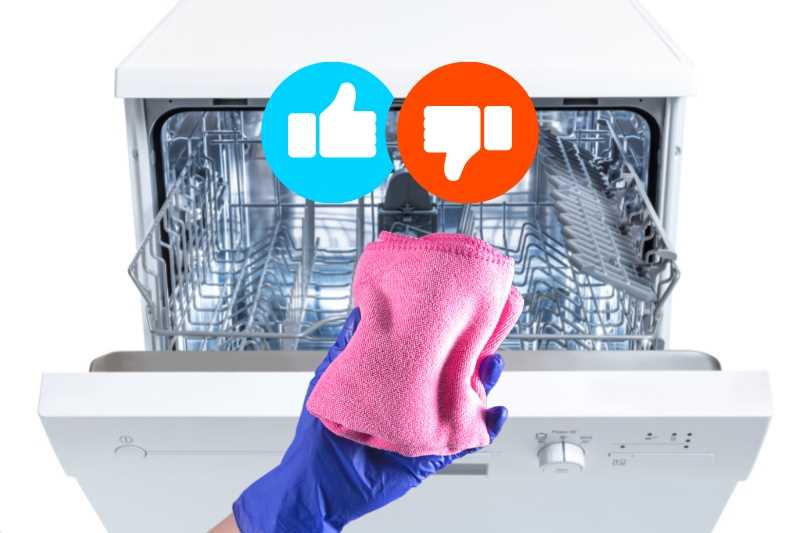
Occasionally, you may need to use a dishwasher cleaner to remove stubborn stains or odors. Make sure to use a cleaner that is specifically designed for dishwashers and follow the manufacturer’s instructions. This will help keep your dishwasher’s interior clean and free from buildup.
6. Check the Water Supply
To ensure that your dishwasher is working efficiently, check the water supply regularly. Make sure the water supply valve is fully open and there are no kinks or blockages in the water line. Clean the water inlet screen if necessary to remove any debris that may be affecting the water flow.
7. Avoid Overloading
Overloading the dishwasher can put unnecessary strain on its components and affect its performance. Be mindful of the dishwasher’s capacity and avoid overcrowding dishes and utensils. This will help ensure that water and detergent can circulate freely, resulting in cleaner and more efficient wash cycles.
Following these simple maintenance tips will not only help prolong the lifespan of your dishwasher but also keep it functioning at its best. By taking care of your dishwasher, you can enjoy sparkling clean dishes and reliable performance for years to come.
Troubleshooting Common Dishwasher Issues
If your dishwasher is not functioning properly, there could be several common issues that you may encounter. Here are some troubleshooting tips to help you identify and solve these problems:
1. Dishwasher not starting
If your dishwasher is not starting, the first thing you should check is if it is plugged in and receiving power. Ensure that the power cord is securely plugged into a functioning outlet. If it is, check the circuit breaker to see if it has tripped. Reset the breaker if necessary.
2. Dishes not cleaning properly
If your dishes are not coming out clean after a wash cycle, there could be several reasons for this. Make sure that the dishes are loaded properly, taking care not to block the spray arms. Check if the water inlet valve is clogged or if the spray arms are blocked with debris. Additionally, ensure that you are using the appropriate amount of detergent and that it is fresh and not expired.
3. Dishwasher not draining
If your dishwasher is not draining properly, there may be a clog in the drain hose or the dishwasher drain pump may be malfunctioning. Check the drain hose for any blockages and clear them if necessary. If the drain hose is clear, the drain pump may need to be replaced. Refer to the dishwasher’s manual for instructions on how to replace the drain pump.
4. Dishwasher making strange noises
If your dishwasher is making unusual noises such as grinding, rattling, or banging, it could be due to a few reasons. Check if any dishes or utensils are blocking the spray arms or if there are any loose parts inside the dishwasher. Additionally, inspect the dishwasher’s motor or pump for any signs of wear or damage.
5. Dishwasher not dispensing detergent
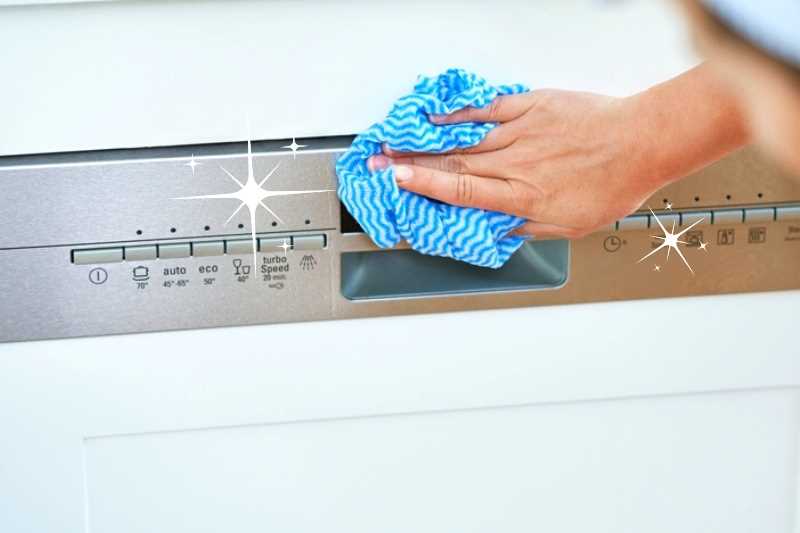
If your dishwasher is not dispensing detergent properly, there may be an issue with the detergent dispenser. Check if the dispenser is clogged with detergent residue and clean it if necessary. Also, ensure that the dishwasher door is not blocked and can open freely during the wash cycle.
6. Dishwasher leaking water
If your dishwasher is leaking water, there may be a problem with the door gasket or the water inlet valve. Inspect the door gasket for any signs of wear, cracks, or gaps. Replace the gasket if necessary. Check the water inlet valve for any leaks or cracks and replace it if needed.
7. Dishwasher not drying dishes
If your dishwasher is not drying your dishes properly, there could be a few reasons for this. Check if there is enough rinse aid in the dispenser and ensure the rinse aid setting is properly adjusted. Additionally, make sure that you are using the appropriate drying cycle and that there are no obstructions blocking the heating element.
Conclusion
Troubleshooting common dishwasher issues can help you identify and resolve problems with your appliance. By following these tips and checking for common issues, you can enjoy a fully functional dishwasher and clean dishes every time.
Professional Maintenance Services for Dishwashers
If your dishwasher is experiencing issues or is overdue for maintenance, it may be time to consider professional maintenance services. Hiring a professional can ensure that your dishwasher is thoroughly cleaned and maintained, prolonging its lifespan and improving its performance. Here are some benefits of professional maintenance services for dishwashers:
1. Thorough Cleaning
A professional maintenance service will clean all the interior and exterior parts of your dishwasher, including hard-to-reach areas. They will remove any limescale, grease, or other buildup that may be affecting the dishwasher’s performance.
2. Inspection and Repair
During the maintenance service, the technician will inspect all the components of your dishwasher. They will identify any potential issues or worn-out parts that may need repair or replacement. Fixing these issues early can prevent more significant problems in the future.
3. Enhancing Efficiency
A well-maintained dishwasher operates more efficiently, using less water and electricity. Professional maintenance services include checking for any leaks, adjusting water pressure, and ensuring that the dishwasher is running at optimal efficiency.
4. Extending Lifespan
Regular maintenance can significantly extend the lifespan of your dishwasher. By keeping it clean and addressing any minor issues promptly, you can avoid costly repairs or premature replacements.
5. Expert Advice
Professional technicians have extensive knowledge and experience working with dishwashers. They can provide valuable advice on how to maximize your dishwasher’s performance, including proper loading techniques, detergent recommendations, and water-saving tips.
6. Time-Saving
Hiring a professional maintenance service saves you time and effort. Instead of spending hours cleaning and troubleshooting your dishwasher, you can rely on experts to handle the job efficiently and effectively.
7. Peace of Mind
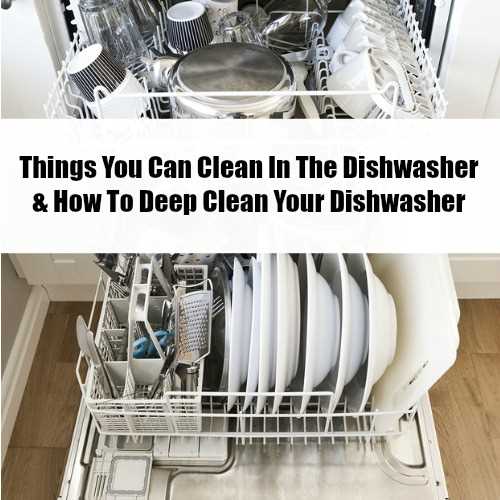
Knowing that your dishwasher is in good hands can give you peace of mind. Professional maintenance services come with warranties or guarantees, so you can trust that any issues will be resolved without additional cost to you.
Overall, professional maintenance services for dishwashers are an excellent investment. They ensure that your dishwasher operates at its best, saving you time, money, and frustration in the long run.
FAQ
What are some effective hacks for cleaning and maintaining your dishwasher?
Some effective hacks for cleaning and maintaining your dishwasher include using vinegar and baking soda to remove odors and stains, running a cycle with lemon juice to freshen the dishwasher, and regularly cleaning the filters and spray arms.
How can I remove stubborn stains and build-up from my dishwasher?
To remove stubborn stains and build-up from your dishwasher, you can use a mixture of vinegar and baking soda. First, sprinkle baking soda on a damp sponge and scrub the stained areas. Then, spray vinegar onto the sponge or directly onto the stains and scrub again. Rinse the area with water and repeat if necessary.
Is it necessary to clean the filters and spray arms of a dishwasher?
Yes, it is necessary to clean the filters and spray arms of a dishwasher regularly. Over time, food particles and debris can accumulate in these areas, which can affect the performance and cleanliness of your dishwasher. Cleaning them will ensure that your dishwasher works efficiently.
How often should I clean and maintain my dishwasher?
It is recommended to clean and maintain your dishwasher once a month. This includes cleaning the filters, spray arms, and the interior of the dishwasher. Regular maintenance will help prolong the life of your dishwasher and keep it running smoothly.
Can I use lemon juice to clean my dishwasher?
Yes, you can use lemon juice to clean your dishwasher. Running a cycle with lemon juice can help remove odors and freshen up your dishwasher. Simply fill a dishwasher-safe bowl with lemon juice and place it on the top rack of your empty dishwasher. Run a hot water cycle and your dishwasher will be refreshed.
What should I do if my dishwasher has a bad odor?
If your dishwasher has a bad odor, there are a few things you can do. First, check and clean the filters and spray arms. Next, sprinkle baking soda on the bottom of the dishwasher and run a hot water cycle. You can also place a bowl of vinegar on the top rack and run a cycle to eliminate odors. If the problem persists, you may need to call a professional to inspect and clean your dishwasher.
Can I use bleach to clean my dishwasher?
While bleach can be effective in cleaning and disinfecting, it is not recommended to use bleach in your dishwasher. The harsh chemicals in bleach can damage the rubber components and stainless steel surfaces of your dishwasher. It is better to use vinegar or baking soda as natural alternatives for cleaning your dishwasher.








